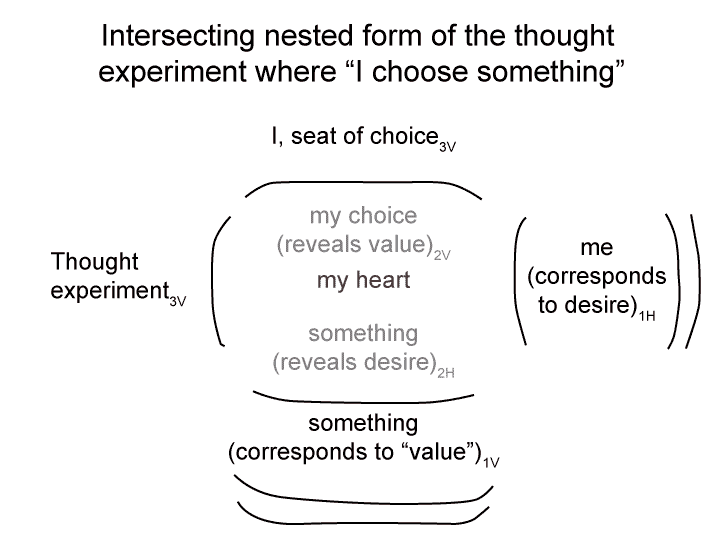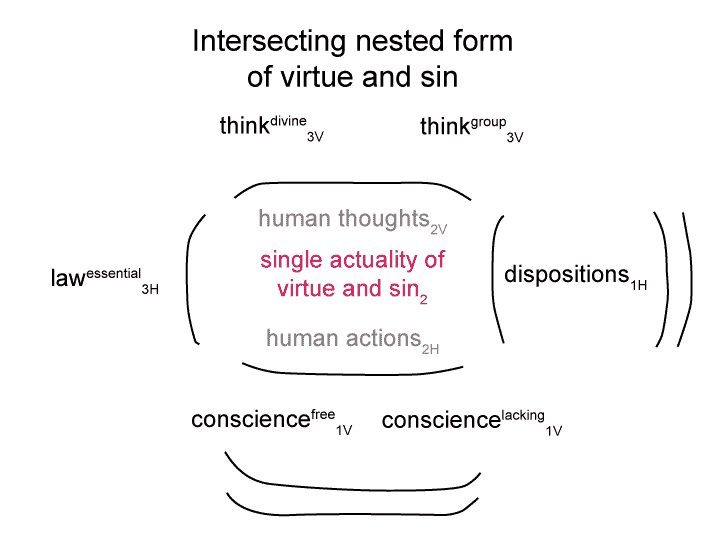Category Archives: Defining Religion
Man and Sin by Piet Schoonenberg (1964) 2.3 FW
[The possibility underlying my choice1b sounds like the word “value”.
So does the thought experiment3a taking me?
The thought experiment3 brings something2a into relation with the possibilities inherent in me1a.
The possibilities inherent in me1a sound like the word “desire”.]
Man and Sin by Piet Schoonenberg (1964) 2.3 FV
Summary of text [comment] page 83
[Where does I, seat of choice3b take me?
I, the seat of choice3b or perhaps, my heart2 determines the meaning of something1b. I3b guarantee that meaning1b
Plus, a message about something3b comes from me (my seat and my heart) when my choice has been made2b.]
Man and Sin by Piet Schoonenberg (1964) 2.3 FU
Summary of text [comment] page 83
[In section 2.3, Schoonenberg discusses freedom.
My model for freedom is the thought experiment where ‘I choose something’.
So, I ask the question:
When I, the seat of choice chooses, do I choose a value?
If so, how does value link to the word ‘freedom’?]
Man and Sin by Piet Schoonenberg (1964) 2.3 FP
Summary of text [comment] page 83
‘Freedom of will’ is implicit in the Scripture’s use of the word ‘heart’.
What comes from the heart?
Thoughts, words and deeds come from the heart. Choice comes from the heart.
[Have we seen something like this before?]
Man and Sin by Piet Schoonenberg (1964) 2.3 FO
Summary of text [comment] page 83
[The declaration, ‘I am not my sin.’, simultaneously evokes the question: Who am I?]
Man and Sin by Piet Schoonenberg (1964) 2.3 FN
Summary of text [comment] page 83
[Schoonenberg argued that Paul’s phrase in Romans 7:17 indicates bondage to sin.
In An Archaeology of the Fall (sections 294 through 299) this same verse indicates Paul’s release from the bondage of sin.
Otherwise, how could he say, ‘I am not my sin.’?]
Man and Sin by Piet Schoonenberg (1964) 2.3 FM
This leads to the question:
Does bondage to sin mean the suppression of all freedom?
Schoonenberg answered like this:
Yes, if the term “freedom” is understood simply in contrast to “bondage”.
No, if the term “freedom”’ means “freedom of the will”, a correspondence the Bible never uses, but is implicit in the Scriptures use of the word “heart”’.
Man and Sin by Piet Schoonenberg (1964) 2.3 FL
Summary of text [comment] page 83
[Schoonenberg moved to another facet of virtue and sin.]
According to Paul, sin rules in “man” and over “man” through concupiscence.
Schoonenberg quoted Paul’s Letter to the Romans 7:17. His sinful deeds “are not done by I, but by the sin that dwells in me.”
Paul is in bondage to a sinful attitude that renders him powerlessness.]


